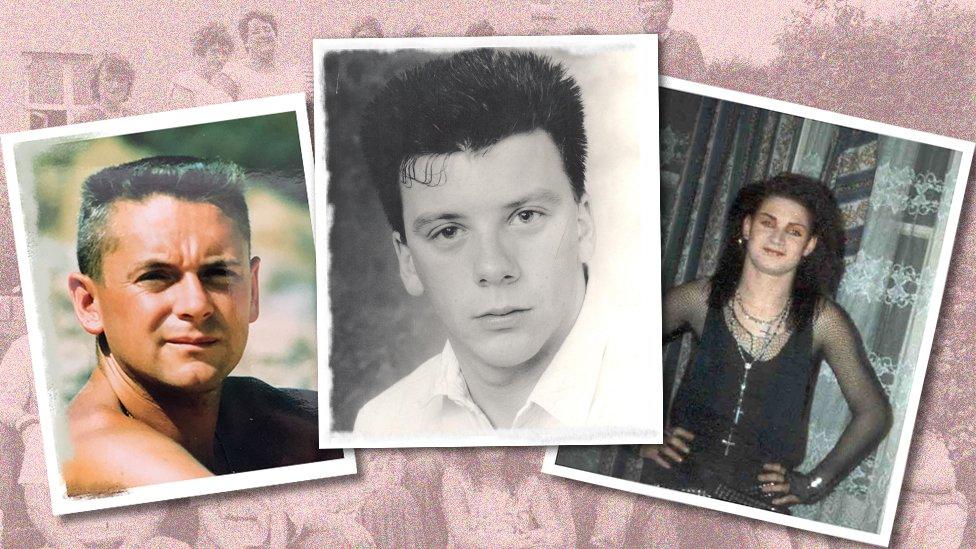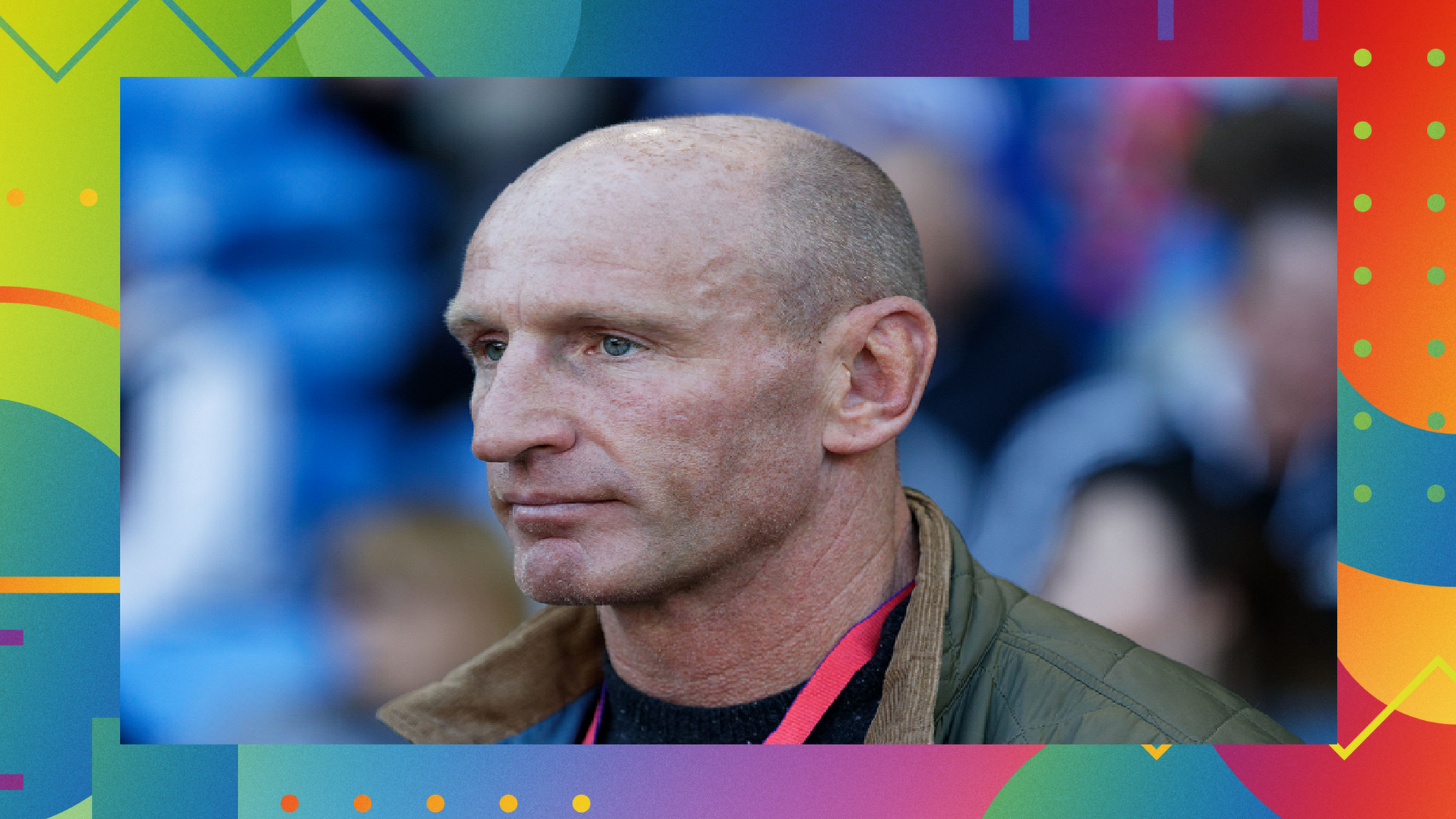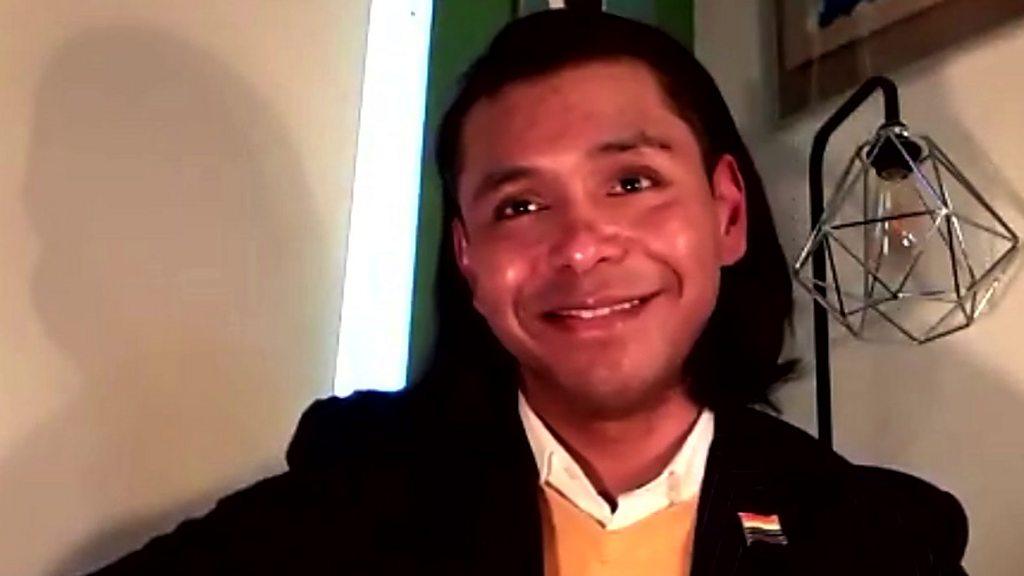It's a Sin: David Furnish praises man for revealing HIV status after being inspired by show
- Published

It's a Sin characters (left to right) Colin, Ritchie and Jill
A British man who kept his HIV diagnosis a secret for 10 years has been praised for opening up about it after watching It's a Sin.
The Channel 4 series follows a group of friends who move to London in 1981 and have their lives turned upside down by the outbreak of the Aids crisis.
Luke Kelly, 30, saw it and was inspired to reveal his HIV status on Instagram.
David Furnish, chair of the Elton John Aids Foundation, described him as "a hero" on BBC News on Monday.
Mr Kelly, whose original Instagram live video, external in conversation with his friend has been watched more than 47,000 times since it was posted on 20 February, was first diagnosed in 2011 when he was 21.
He told the BBC's Victoria Derbyshire on Monday he thought he was going to die when he first found out, and how he had felt great shame about contracting what is now considered to be a "very manageable" virus.
"I actually thought about, 'How can my parents see me die?'" said Mr Kelly. "And this is quite a traumatic experience to have to go through when you're 21, and that could have been avoided had there been a bit more education."
It’s A Sin: Olly Alexander says young gay people have messaged him saying they can’t believe it happened
'So much shame'
Watching It's A Sin, which stars Olly Alexander and Lydia West, brought those emotions back into sharp focus but in a fresh context, he said.
"There was so much that came up for me that I resonated with, and I kind of thought I was fine with my my status, because it has been 10 years," Mr Kelly added. "But I realised it's something that I was hiding - it was a secret.
"There's so much shame associated with HIV, and there's so much negativity and it kind of stems from the fear that was set up in in the 80s, because there was no medication available," he continued.
"The government had to put this fear out there to the public - it's a little bit like what we see with coronavirus, people feel scared. And I understand why it happened, [but] the government and the media never really did a follow-up story so people aren't aware of what it is like to live with HIV today - it's completely different now."
Allow Instagram content?
This article contains content provided by Instagram. We ask for your permission before anything is loaded, as they may be using cookies and other technologies. You may want to read Meta’s Instagram cookie policy, external and privacy policy, external before accepting. To view this content choose ‘accept and continue’.
Despite the advancements in medical science, he said, some attitudes around the virus - and towards gay people generally - remain stuck in the past.
"I couldn't even tell my parents back then because it was just something that I was so ashamed of, [there was] so much stigma attached to it.
"The shame comes out of the homophobia really, so that still exists today."
'Put an end to HIV'
While he was speaking to the BBC News Channel, David Furnish, who is married to Sir Elton John, surprised Mr Kelly with a message of support and thanks for helping to fight the stigma around the virus.
"Luke, I take my hat off to you - you're a hero," said Furnish.
"The Instagram chat that you put up with your friends serves as such an inspiration to so many people.
Cured of HIV: I want to end stigma and discrimination
"You are the most robust, happy, living example of what it's like to live with HIV nowadays. And you're so incredibly well informed about how the virus is transmitted and prevented and how well the drugs work."
He added: "If more people did what you did... we could put an end to HIV."

What is HIV?
HIV stands for Human Immunodeficiency Virus - the immunodeficiency is the weakening of the immune system by the virus.
It has been passed on between humans for many decades but was only identified in the early 1980s.
If left untreated, infection with HIV progresses through a series of stages, leading to late-stage HIV or Aids
HIV can be passed on through blood or semen but not passed on by spitting, sneezing, coughing, kissing or general social contact.
There is now robust evidence to say, with confidence, that people on effective HIV treatment , externalcan't pass on the virus.
There are an estimated 94,100 people living with HIV in the UK, around 2,200 of them in Wales; 4,484 people were diagnosed in 2018, a 28% decline since 2015.
As a result of combination prevention - condom use, HIV-prevention drug pre-exposure prophylaxis (PrEP), expanded HIV testing and of antiretroviral therapy - there has been a 39% fall in diagnosis among gay and bisexual men since 2015
Sources: Terrence Higgins Trust, external and Public Health England, external

Follow us on Facebook, external or on Twitter @BBCNewsEnts, external. If you have a story suggestion email entertainment.news@bbc.co.uk, external.
Related topics
- Published5 February 2021

- Published13 February 2021

- Published5 February 2021

- Attribution
- Published24 February 2021

- Published1 December 2020
